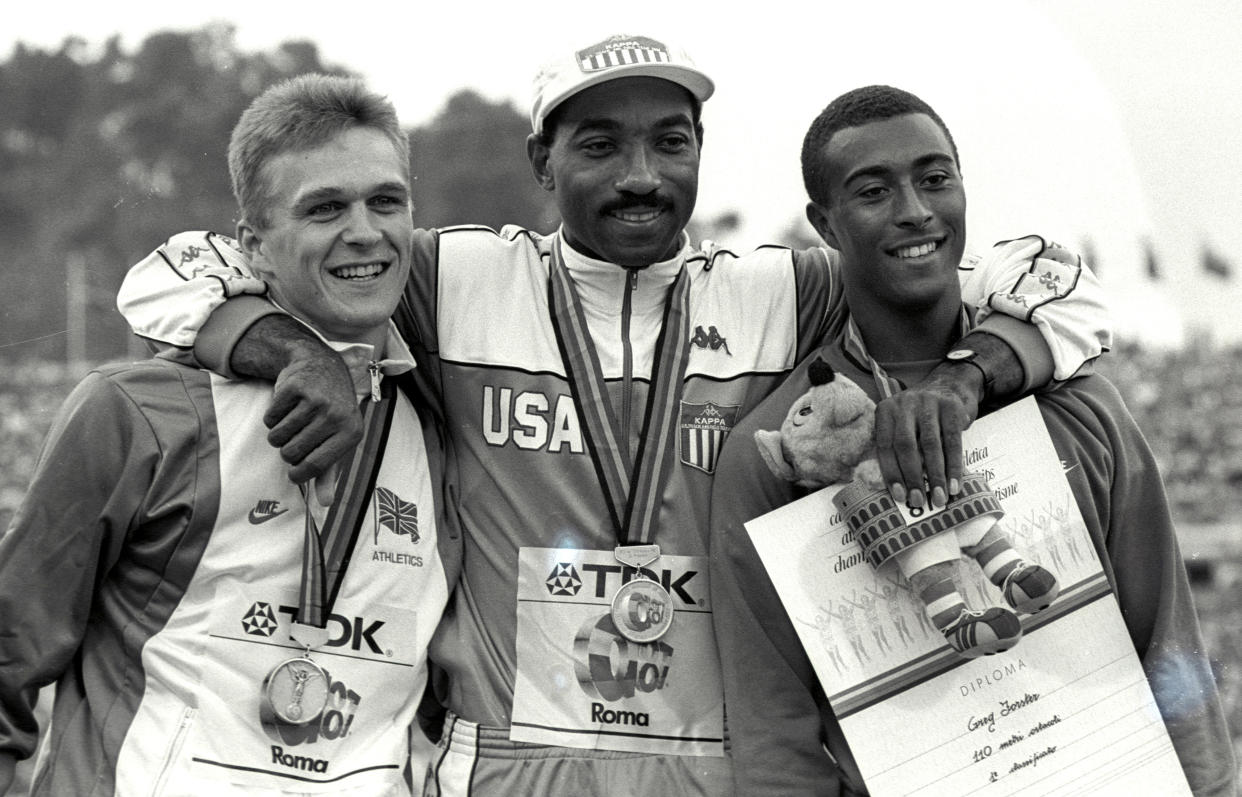Greg Foster, Hall of Fame hurdler, Olympian and three-time world champion, dies at 64

Greg Foster, the 1984 Olympic silver medalist and three-time world champion in the 110-meter hurdles, died Sunday night at the age of 64, according to multiple reports. He had amyloidosis, a rare disease that affects the heart. He underwent heart transplant surgery in January.
One of track and field's greatest hurdlers, Foster was a superstar during his time at UCLA. Winning two 110 hurdle individual NCAA championships, he also helped UCLA win a team title in 1978.
Foster went on to win three consecutive World Championship gold medals in the 110 hurdles in 1983, 1987 and 1991. He was inducted into the UCLA's Athletic Hall of Fame in 1993.
In 1984, he won a silver medal at the Los Angeles Olympic Games under top track coach Bobby Kersee. He entered the games with the world’s four fastest times, but after Foster flinched during his start, Roger Kingdom beat him to the line by three hundredths from lane eight.
“For a year and a half before that Olympics, I never lost,” Foster told the Chicago Tribune. “I would have loved to lose all those races and win the Olympics.”
Foster took a major risk at the 1988 Olympic Trials
Four years later, he didn’t make the U.S. team, but came close while running with a broken arm. He sustained the injury during a routine practice a little over two weeks before the 1988 Olympic Trials.
Foster had two pins inserted to hold the broken bones together and stayed in the hospital for days. Foster told the Los Angeles Times that doctors said he would have a 50% chance at losing ability to use his arm if he fell on it again.
With a cast on his forearm, he made it to the semifinal, hit several hurdles and wasn’t able to complete the race. Kersee called it “a vision of the Olympic spirit more lasting than any medal,” via Sports Illustrated.
Foster announced his retirement at 34 years old to become a full-time bookkeeper for his wife Marie’s hair-styling salon. At the time, the couple reportedly lived in Chino Hills, California with two sons, Brandon and Bryce. In his retirement, Foster spoke with the Los Angeles Times about his career. He was less impressed with his iconic arm-cast effort and more nostalgic about his long standing rivalry with Renaldo Nehemiah.
“I at least had to try,” Foster said of his iconic race. “As far as it being a triumph, no. I was just kind of handicapped.”
In August 1981, Foster ran his personal best of 13.03 seconds behind Nehemiah, who became the first man to break 13 seconds in the 110 hurdles. The Washington Post called Foster the “Gehrig to [Nehemiah’s] Ruth, Alydar to Affirmed, the Lakers to the Celtics.”
“If Bobby said, 'Be here at 6 o'clock in the morning,' I would be here at 6 o'clock in the morning. I knew that I had to get ready because Renaldo was always ready,” Foster said.
Foster broke his left arm once again in a 1989 pickup basketball game that included MLB great Darryl Strawberry and also broke the fifth metatarsal in his right foot in 1990.
That year, he tested positive for three banned stimulants commonly found in over-the-counter medication. He was barred from competition for three months and came back to win his third consecutive world title in 1991.
In addition to his World Championship, collegiate and Olympic accolades, he also tallied 10 USA national titles with six indoor (60m hurdles from 1983-85, 55m hurdles from 1987-88 and 60m hurdles in 1991) and four outdoor (110m hurdles in 1981, 1983, 1986-87). He was inducted into the National Track and Field Hall of Fame in 1998.
